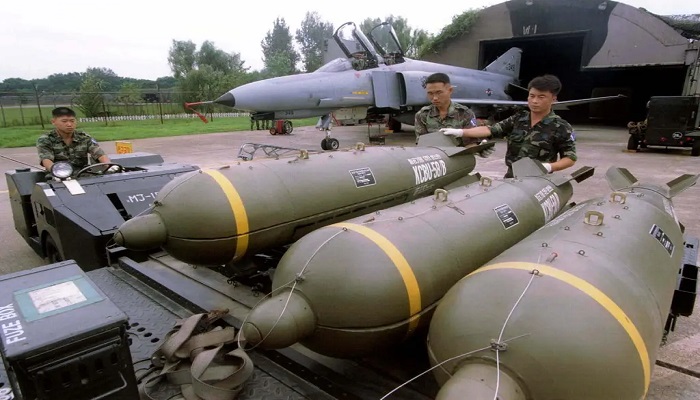Banned bombs: What are cluster munitions and should Ukraine get them?
Cluster munitions are a type of weaponry that disperses numerous small bomblets over a wide area during flight, aiming to explode upon impact
July 08, 2023

The United States has announced its compliance with a request from Ukraine to supply it with controversial cluster munitions, a decision that has drawn criticism from human rights groups because these weapons are banned in over 120 countries.
What are cluster bombs?
Cluster munitions are a type of weaponry that disperses numerous small bomblets over a wide area during flight, aiming to explode upon impact. However, a significant number of these bomblets are "duds" and may not detonate initially, posing a threat to unsuspecting individuals who come into contact with them later on.
From a military standpoint, cluster munitions can be highly effective against entrenched ground troops, rendering large areas unsafe until thoroughly cleared.
Nevertheless, their indiscriminate nature and potential harm to civilian populations have led to the signing of an international treaty, the Convention on Cluster Munitions, by over 100 countries—including the UK, France, and Germany—that prohibits their use and stockpiling.
Human rights organisations have strongly condemned cluster munitions, considering them "abhorrent" and even a war crime.
While Russia and Ukraine have both used cluster munitions since the beginning of Russia's full-scale invasion in February 2022, neither country has signed a treaty banning these weapons.
The United States, although not a signatory of the treaty, has previously criticiseed Russia's extensive use of cluster munitions. Russian cluster munitions reportedly have a high "dud rate" of 40%, leaving a significant number of unexploded bomblets on the ground, whereas the average dud rate is believed to be around 20%. The Pentagon estimates that its own cluster bomblets have a dud rate of less than 3%.
Ukraine's request for cluster munitions stems from a severe shortage of artillery shells, as they are being rapidly depleted due to the ongoing conflict with Russia. Artillery has become a crucial weapon in the static battlefronts of southern and eastern Ukraine, where Ukrainian forces are attempting to dislodge the well-entrenched Russian troops along a 1,000km (621-mile) front.
Why Ukraine needs cluster bombs
With the limited availability of artillery shells, Ukraine has turned to the US to replenish its cluster munitions supply, specifically to target the Russian infantry occupying defensive trenches.
However, this decision has not been without controversy. Many Democrats and human rights advocates in the US oppose the provision of cluster munitions to Ukraine.
The debate surrounding this issue has been ongoing for several months.
Erosion of moral high ground
The immediate consequence of the US decision is the erosion of the moral high ground for Washington in this conflict.
While Russia's alleged war crimes have been extensively documented, the US's compliance with Ukraine's request may invite accusations of hypocrisy. Cluster munitions are widely regarded as a horrific and indiscriminate weapon, banned in many parts of the world for valid reasons.
This move by the US could potentially strain its relationship with Western allies, and any perceived divisions within the alliance would play into the hands of Russian President Vladimir Putin, who seeks to exploit such discord.









